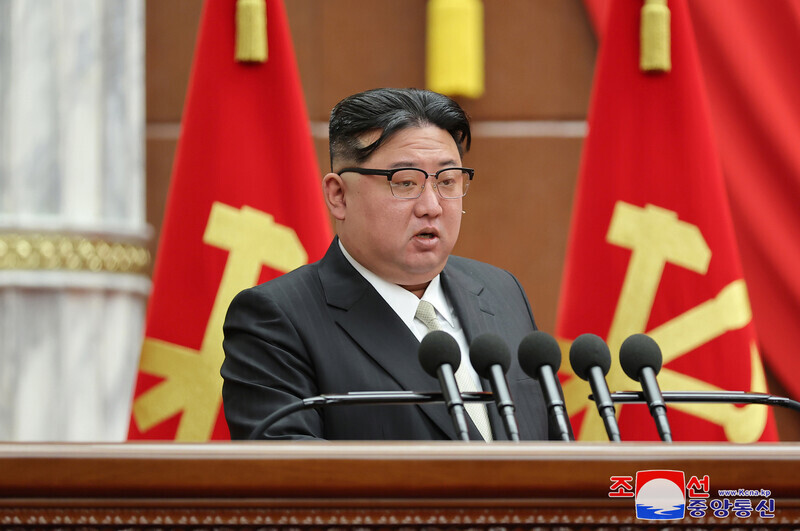hankyoreh
Links to other country sites 다른 나라 사이트 링크
[Editorial] Kim’s belligerent rhetoric illustrates worrisome state of inter-Korean ties

North Korean leader recently issued a barrage of inflammatory remarks describing South Korea as the “principal enemy” and making references to “war” and “annihilating” the South.
While North Korea has referred to South Korea as a “principal enemy” in the past, this is the first time Kim himself has publicly used the term. Coming on the heels of his declaration late last year describing inter-Korean relations as being between “two belligerent states,” this behavior of ratcheting up tensions with increasingly coarse threats is deeply dismaying.
While engaging in field guidance at key munitions factories on Monday and Tuesday, Kim declared that “the ROK clan is our principal enemy.” ROK stands for Republic of Korea, South Korea’s official name.
“If the ROK dares attempt to use armed forces against the DPRK or threaten its sovereignty and security [. . .] we will have no hesitation in annihilating the ROK by mobilizing all means and forces in our hands,” he was quoted as saying.
It's unusual for Kim to personally describe South Korea as the “principal enemy.” In a speech in October 2021, he said, “Our arch-enemy is the war itself, not south Korea, the United States or any other specific state or forces.”
But after Yoon Suk-yeol, who became president of South Korea in May 2022, announced that he planned to regard North Korea as the South’s “principal enemy,” North Korea began adopting similarly harsh language. For example, Kim’s powerful younger sister Kim Yo-jong remarked on August 2022 that the “south Korean puppets” are the “invariable principal enemy” of the North.
At the end of 2023, Kim described inter-Korea relations as being “the relations between two states hostile to each other and the relations between two belligerent states, not consanguineous or homogeneous ones anymore” in what he said was a fundamental change of direction on affairs with the South.
It’s reckless and unfortunate that Kim would threaten South Korea in such crude and extreme terms. He seems to have decided that it’s to his advantage to set up external enemies to bolster internal cohesion and, on an international level, to cozy up to Russia and China to reinforce a front against South Korea, the US and Japan.
As a result, North Korea is likely to brazenly wield the threat of tactical nuclear weapons aimed at South Korea and carry out more military provocations along the border while expanding its nuclear weapon and missile capabilities this year. South Korea has no choice but to take thorough precautions against such threats.
Nevertheless, South Korea’s Yoon and Defense Minister Shin Won-sik’s emphasis on trilateral security cooperation with the US and Japan and “peace through strength” along with their planning of more military exercises and suspension of a 2018 buffer-creating military pact with North Korea aren’t an effective response — in fact, such acts only serve to exacerbate inter-Korean affairs, which are already in a perilous state of tension.
Another problem is that the Yoon administration has been ignoring diplomacy with China, which is crucial for managing the situation, and has been creating unnecessary friction with Russia. The more reckless North Korea becomes, the more prudent the South Korean government should be in its handling of the situation, and the wiser it should be in finding a diplomatic solution to the crisis, as befits its international prestige.
Please direct questions or comments to [english@hani.co.kr]

Editorial・opinion
![[Editorial] Intensifying US-China rivalry means Seoul must address uncertainty with Beijing sooner than later [Editorial] Intensifying US-China rivalry means Seoul must address uncertainty with Beijing sooner than later](https://flexible.img.hani.co.kr/flexible/normal/500/300/imgdb/original/2024/0517/8117159322045222.jpg) [Editorial] Intensifying US-China rivalry means Seoul must address uncertainty with Beijing sooner than later
[Editorial] Intensifying US-China rivalry means Seoul must address uncertainty with Beijing sooner than later![[Column] When ‘fairness’ means hate and violence [Column] When ‘fairness’ means hate and violence](https://flexible.img.hani.co.kr/flexible/normal/500/300/imgdb/original/2024/0516/7417158465908824.jpg) [Column] When ‘fairness’ means hate and violence
[Column] When ‘fairness’ means hate and violence- [Editorial] Yoon must stop abusing authority to shield himself from investigation
- [Column] US troop withdrawal from Korea could be the Acheson Line all over
- [Column] How to win back readers who’ve turned to YouTube for news
- [Column] Welcome to the president’s pity party
- [Editorial] Korea must respond firmly to Japan’s attempt to usurp Line
- [Editorial] Transfers of prosecutors investigating Korea’s first lady send chilling message
- [Column] Will Seoul’s ties with Moscow really recover on their own?
- [Column] Samsung’s ‘lost decade’ and Lee Jae-yong’s mismatched chopsticks
Most viewed articles
- 1[Editorial] Transfers of prosecutors investigating Korea’s first lady send chilling message
- 2For new generation of Chinese artists, discontent is disobedience
- 3S. Korea “monitoring developments” after report of secret Chinese police station in Seoul
- 4[Photo] 1,200 prospective teachers call death of teacher “social manslaughter”
- 5[Exclusive] Unearthed memo suggests Gwangju Uprising missing may have been cremated
- 6[Column] Samsung’s ‘lost decade’ and Lee Jae-yong’s mismatched chopsticks
- 7[Column] When ‘fairness’ means hate and violence
- 8Xi, Putin ‘oppose acts of military intimidation’ against N. Korea by US in joint statement
- 9[Special reportage- part I] Elderly prostitution at Jongmyo Park
- 10[News analysis] Samsung in management crisis due to owner risk